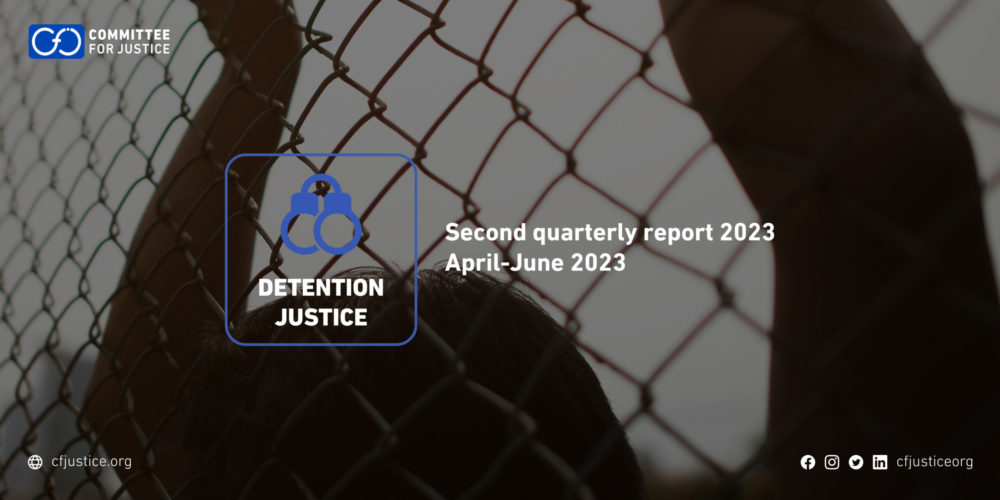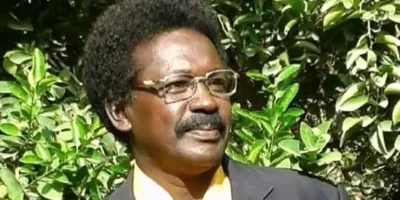As the second quarter of 2023 unfolded, the economic crisis in Egypt continued to cast its shadow, and the societal discontent escalated. Despite the apparent progress in national dialogue as the Egyptian government sought to address the crisis before the presidential elections, security forces did not cease their reliance on security measures, including threats and persecution, against citizens and opposition politicians expressing their views on the economic and political situation.
During the reporting period, the Committee for Justice (CFJ) documented 1,124 violations occurring within April, May, and June. These violations were distributed among various categories, with the highest percentage (approximately 91%) falling under arbitrary deprivation of liberty, totaling 1,023 violations. Other categories included violations related to detention conditions, with 45 documented violations, enforced disappearances with 28 documented cases, torture with 20 documented cases, and finally, 8 documented cases of deaths within detention facilities. Documentation activities covered 13 Egyptian governorates, with Cairo having the highest number of violations, totaling 855.
The Badr Prison area had the highest number of documented violations with a total of 58 documented violations, including 27 violations related to poor detention conditions, which include intentional denial of healthcare.
As for the documentation work with the victims’ families, recurring patterns of enforced disappearances, torture crimes, and arbitrary arrests of citizens were noted, in addition to the poor conditions inside 4 different detention centers, where testimonies from them were documented during the reporting period.
The UN communication team continued its efforts to pressure the Egyptian authorities to stop or reduce human rights violations. The team contributed by submitting 14 complaints and correspondences regarding victims and developments in the human rights situation in Egypt to various United Nations bodies and teams, including the Working Group on Arbitrary Detention, the Special Rapporteur on Human Rights Defenders, the Special Rapporteur on Torture, and the Special Rapporteur on the Protection and Promotion of Human Rights in the Context of Counter-Terrorism.
Among the notable correspondences adopted for action with the Egyptian government were two complaints submitted to the Working Group on Arbitrary Detention on behalf of three victims, a complaint concerning enforced disappearances of four victims, and a complaint regarding the student Moaz al-Sharqawi, who appeared during the reporting period approximately a month after his enforced disappearance.
CFJ emphasized that the data and practical evidence presented in the report confirm that there are still numerous human rights violations being carried out by the state through its various branches against citizens, activists, and those involved in public affairs.
In conclusion, CFJ recommended that the Egyptian security authorities should reflect the declared position of the regime regarding the political landscape, including the steps towards national dialogue, the formation of a presidential pardon committee, and the previously launched National Human Rights Strategy. It should not be merely an attempt to create propaganda for both domestic and international audiences in preparation for the 2024 presidential elections.
CFJ also called on the Egyptian authorities to cease the security-oriented approach in dealing with the cases of pretrial detainees and individuals held on political charges, urging them to adhere to international humanitarian standards and laws when dealing with detainees in general, regardless of their religious or political affiliations.
Furthermore, CFJ requested a review of the conditions of detainees, particularly in the rehabilitation and detention center in the city of Badr, and urged the improvement of the poor conditions related to their detention and trials, ensuring fair treatment for both detainees and their lawyers.
CFJ also called for the initiation of a new investigation into the crimes of torture, enforced disappearance, and deliberate denial of healthcare to the victims documented in the report, whether these incidents occurred in official or unofficial detention facilities. CFJ urged the prosecution to pursue the perpetrators and prevent them from escaping justice. Additionally, the report emphasized the need for international oversight and cooperation with international organizations in all detention centers in Egypt to prevent the recurrence of such crimes.






